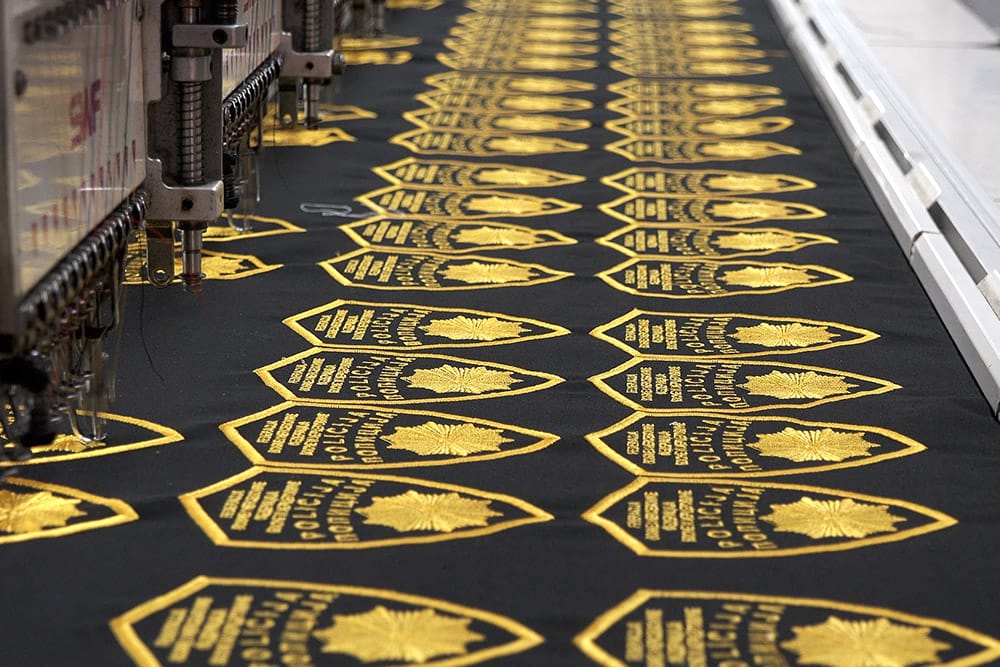For years, four police agencies in Bosnia and Herzegovina (BiH) have been buying uniforms and footwear from KM Trade valued in the millions, following internal regulations that exclude other domestic companies from this business. Under these regulations, police officers are required to wear uniforms and footwear matching the characteristics of the American brand “5.11” and the German brand “Haix”. “KM Trade” from Visoko is the only agent of goods matching the characteristics precisely described in the regulations.
As a result, since 2013 the company from Visoko has earned at least BAM 17.5 million through public procurement doing business with The Ministry of the Interior of the Sarajevo Canton (MUPKS), the Directorate for Coordination of Police Bodies of BiH, the Ministry of the Interior of the Republika Srpska (MUPRS) and the Federation Police Administration (FUP).
At the same time, the rulebooks issued by the MUPKS and the Directorate are not in line with the regulations stipulating that such rulebooks can be adopted only for the procurement of uniforms for special units, not for “ordinary” police officers.
In Bosnia and Herzegovina, at least 13 more companies manufacture, export, and distribute uniforms to a dozen European countries. Those interviewed by CIN journalists claim not to be able to win the contract because some police agencies are pushing for the purchase of one brand only. Even though each of them can procure material and make a uniform matching the “American” one, they dare not applying to tenders in fear of lawsuits because “KM Trade” is the only one authorized to sell the uniforms in BiH.
Representatives of MUPKS say they cannot recall i.e., have no knowledge of who and how has drafted this rulebook. The FUP and the Directorate claim to have copied the content of the previously adopted rules, while the MUPRS did not want to talk about the rulebook, which is marked as classified.
Through Rulebook To Monopoly
“KM Trade” was founded 22 years ago by Kadrija Kolić, a lawyer, and Nihad Mašić, a businessman. The company trades in weapons, ammunition, clothing, footwear, optics, binoculars, bags, and containers, as well as drones and other equipment, which they sell in stores and through public procurement procedures.

According to the available financial statements, in the period from 2010 to 2013, the annual profit of the company never exceed BAM 73 thousand. Although most of its profit comes from the weapons, ammunition, and special equipment trade, the company’s business has got a significant boost after it started selling uniforms to police agencies.
From 2013, the MUPKS, MUPRS, FUP, and the Directorate for Coordination of Police Bodies of BiH started to issue rulebooks prescribing the mandatory features of police uniforms, including sketches with detailed descriptions of the type of fabric, stud buttons, dimensions, and arrangement of pockets and flaps, openings for a pen or lamp, badge holders, type of buttons and zipper, making of the shirt shoulders, dimensions and arrangement of belt danglers, the method of processing and other details. All the described details point to “5.11 Tactical”.
The footwear is described in the same way. In addition to the pictures of models that refer to “Haix”, the obligatory characteristics are shown: leather thickness, type of sole, types of sewing, sun reflect leather, waterproof and breathable membrane, antistatic properties, and inner lining made of three-layer or four-layer laminate.
According to the BiH Procurement Law, technical specifications of required goods or services must provide equal access to tender to all bidders and must not refer to a particular manufacturer, brand or origin so as not to exclude some companies from the procurement process. Exceptions exist if the procurement refers to state secrets, public-private partnerships, concessions, international agreements, or if special security measures are required in the procurement, which was not the case here.
CIN journalists contacted ten manufacturers and distributors of uniforms and footwear in the country. Representatives of only two companies agreed to an interview, while other companies replied that they do not apply for tenders of the mentioned agencies because they know in advance that “KM Trade” would get the job.
“The rulebook (of the MUPKS, author’s note) was drafted based on a single brand. It is a well-known brand in the world, an import brand. Such a rulebook was drafted, designed so that we cannot make (uniforms, author’s note)”, says Fahrudin Čančar, owner of “Zenko” from Zenica, a company manufacturing uniforms for 25 years.

According to Haris Sejdić, owner of the Tešanj-based company “Danial’S”, his company has been working for the Slovak, German, Polish, Montenegrin and Albanian police for two decades.
“Some agencies have made some specifications in advance, hence it was not possible to work, and these agencies and, perhaps some people there started a rumor about the local stuff not being good or being contestable, says Sejdić.
The owners of “KM Trade”, Nihad Mašić, and Kadrija Kolić did not want to talk to CIN journalists. “I am a lawyer, I do not deal with those things”, Kolić said briefly.
Regulations Fell From The Sky
A year before the adoption of the contested rulebook, the then Minister of the Interior of Sarajevo Canton, Muhamed Budimlić, purchased police uniforms and footwear from seven companies, following the Decree on the Unified Police Uniform of the Federation of BiH. The uniforms and shoes were bought and distributed, but the officers never put them on because the then police commissioner, Vahid Ćosić withdrew them from use, claiming that they did not match the technical specifications. The Sarajevo Canton Police Union also wanted other uniforms, claiming that the purchased uniforms were radioactive. The uniforms were later donated to the Posavina and Bosnian-Podrinje Cantons.
Budimlić told CIN journalists that the uniforms he purchased came with the certificate of the Quality Assurance Institute. Still, Sarajevo police officers did not put them on, and Budimlić was in the meantime removed from office. In mid-2013, half a year after the appointment, Budimlić’s successor Nermin Pećanac passed the Rulebook on a special uniform for specific geographical and climate conditions, after which MUPKS purchased uniforms exclusively from the “KM Trade”.
“In my opinion, he had no legal argument against wearing those uniforms, hence, he had no legal argument for proposing a new rulebook”, said former Minister Budimlić.
According to the regulations, cantonal and federal ministers and the Directorate for Coordination of BiH Police Bodies can prescribe special uniforms and additional parts of uniforms only for special units and specific conditions, but not for regular uniforms worn by most police officers. For the Directorate, these rules are determined by the Council of Ministers of BiH, and for the Cantonal and Entity Ministries by the Government of the Federation.
Under the rulebook passed at the time of Pećanac, the same uniforms were to be worn by all units, which means that police officers in the Bjelašnica mountain were to wear the same uniforms as officers in the lower and warmer parts of the canton. In addition, Sarajevo police officers have different uniforms than their peers in the rest of the Entity, which is contrary to FBiH regulations.
“If the law stipulated such a rule, no one has the right to change it by a rulebook”, says Sanel Nezirić, a lawyer and public procurement expert.
It is apparent from the decision of the Ministry of the Interior that the Commission tasked with drafting the proposals for amendments to the Rulebook comprised the then employees Bensad Efendić, Almir Pašić, Muhamed Mulaomerović, Senada Idrizović, and Mirsad Đelilović, who did not want to speak to CIN. Commission President, Zejnil Lučkin, briefly replied that he did not remember whether he was in the Commission at all, refusing to talk further about it.
The Cabinet of the current Minister, Admir Katica, claims to have no decision on forming this working group nor do they know who were the members thereof. The Police Administration claims that none of the mentioned persons participated in the development of the Rulebook.
Today, Pećanac and Ćosić are passing the buck to one another. Pećanac claims to have left the decision on the choice of uniform to the Police Directorate and only signed the final document, while Ćosić claims that Pećanac did it all and the Police Directorate had nothing to do with it, although it was determined that the rulebook shall be adopted at the Commissioner’s proposal.

From December 2013 until today, MUPKS has bought uniforms and footwear from “KM Trade” worth more than four million BAM. Under the last year’s decision, the uniforms will no longer be purchased until a new regulation on a single FBiH police uniform is passed.
Copy-pasting Rules
After the Sarajevo police, in 2014, members of the Directorate for Coordination of Police Bodies of BiH too started wearing the “American” uniforms. This was made possible by the Rulebook on Special Uniforms created by a six-member commission.
Enver Džihanić, a commission member, explained to CIN that this body consulted with police officers and several uniform manufacturers, but no one suggested to them what they should put in the Rulebook. When asked about the technical specifications of uniforms and footwear, he explained that the Commission took them from the earlier regulation. Džihanić and Mira Lazić are the only members of the Commission who still work in the Directorate. Other members, namely Belma Trajkov, Gorana Krtalić, Delila Kreštalica, and Sonja Govedarica did not respond to messages or refused to talk to CIN journalists.
The new rulebook of the Directorate is almost identical to the rulebook that was adopted a year earlier in the Sarajevo Canton. It was signed by director Mirsad Vilić, who did not want to talk to journalists.
According to lawyer Sanel Nezirić, adopting the rulebook was contrary to the director’s powers: “If the rulebook further restricts competition, it is clear that the rulebook is not legal.”
Ever since it entered into force, the Directorate has been purchasing the special tactical uniforms and footwear exclusively from “KM Trade”. Over the past six years, almost six million BAM have been set aside for this purpose.
In the middle of 2017, MUPRS joined the Directorate and the Ministry of the Interior of KS, passing a new rulebook on the uniform of police officers. Unlike his colleagues, Minister Dragan Lukač marks this document as classified because its disclosure “could harm operations of the RS and BiH institutions”. Despite the claimed danger, CIN journalists retrieved the rulebook from the website of the institution.
In a written response to CIN, the Ministry of the Interior stated that the Ministry aimed to include in the Rulebook specifications of material, characteristics of uniforms – which must be functional and wearable, as well as quality features, taking account of the specific nature of police work and highlighting the fact that the document does not contain any reference to brand “5.11”.
Two months following the adoption of the Rulebook, this institution purchased uniforms and footwear from “KM Trade” for almost BAM 7.3 million. For this deal to continue after the expiration of the three-year contract, at the end of May 2019, they signed a framework agreement for almost BAM 1.7 million, which allows them to purchase without indicating the details about the time and quantity of delivery.
The RS Ministry of the Interior refused to talk to journalists. They refused to say who drafted the Rulebook, invoking the protection of the privacy of the members of the Commission.
The Rulebook contains technical specifications characteristic of the brand “5.11” and “Haix” footwear, which has been used by the Federal Police Administration since 2019. According to this institution, the development of the Rulebook involved several organizational units, which were responsible for harmonizing it with the regulations. They copied the content from other regulations and adjusted it to their needs, explains Ibro Bešlija from the FUP.
The document was signed by Minister Aljoša Čampara, who says that the Rulebook was prepared by the Police Directorate, hence there was no reason to doubt its appropriateness. Bešija also confirmed not to have checked the legality of the Rulebook.
The FUP did not allow CIN journalists to scan or copy parts of the Rulebook, nor to photograph the uniforms. Since 2019, the Federal Police Administration has bought uniforms and shoes from “KM Trade” in two tenders for a little more than BAM 132 thousand.
An Attempt of a Rulebook
At the end of 2017, the Council of Ministers of BiH adopted the Rulebook on the look of police uniforms in state agencies. It was prepared by a working group composed of representatives of the BiH Ministry of Security and state police agencies. Yet, it did not enter into force because the then chairman, Denis Zvizdić, did not sign it. He refused to speak to CIN.
At that time, domestic manufacturers complained because they were not involved in the development of the rulebook, claiming that it favors “KM Trade”. Dragan Krvavac, president of the Federation of Trade Unions of Police Bodies of BiH, who was also a member of the Working Group, says that the brand “5.11” is not mentioned anywhere and that no one prevents domestic manufacturers from procuring the material and making the required uniform. However, this is not possible because the American brand has copyrighted the material and threatened to sue anyone who makes the same uniform.
“We at “5.11 Tactical” protect our designs and intellectual property from copying and will take actions, where appropriate, against any infringers”, reads the letter, which, according to domestic manufacturers, came from the American company.
After the Rulebook was drafted, several meetings were held with domestic manufacturers to reach a compromise solution – next to the above specifications, the words “or equivalent quality” were added to the document. The proposal of the President of the FBiH Chamber of Commerce, Mirsad Jašarspahić, has not been implemented in practice.
According to the Cabinet of the current Minister of Security, Selmo Cikotić, this year a new text of the Rulebook on the look of police uniforms for state police agencies was completed. However, it does not differ much from the one from 2017 because it still points to the brands “5.11” and “Haix”.
The Federation of BiH is also preparing new regulations, and domestic manufacturers are hoping for non-discriminatory rules. Fahrudin Čančar, owner of the Zenko company from Zenica, made six models of uniforms, hoping that some of them would be accepted. “Apart from companies like mine, there are also companies of better or equal quality in BiH that can certainly make those uniforms”, says he.







